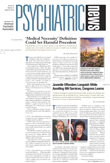The Tennessee legislature passed a law concerning TennCare, the state's Medicaid program, including a definition of medical necessity that has aroused considerable concern among health care professionals and advocates for the poor.
Former APA president Paul Appelbaum, M.D., made the following comments about the definition:
Traditional definitions of medical necessity have turned on whether or not the treatment in question meets professional standards of care. The proposed TennCare definition rejects professional judgment in favor of arbitrary standards that may be particularly problematic for psychiatry.
In requiring “scientifically supported evidence” and“ empirically based objective clinical scientific evidence” for treatments to be considered safe, effective, and nonexperimental, the new definition could exclude from coverage many widely accepted treatment approaches that are difficult to test empirically (for example, psychodynamic and other forms of psychotherapy).
Moreover, since the patients enrolled in clinical trials often differ from those seen in everyday practice (for example, patients with comorbid substance abuse disorders are typically excluded from clinical trials), TennCare reviewers will frequently have at hand a ready excuse to deny any care for which they would rather not pay.
The requirement that any treatment must be the “least costly alternative course of diagnosis or treatment that is adequate for the medical condition of the enrollee” threatens endless disputes over what constitutes adequacy—a term without referent in clinical practice. If a treatment controls symptoms well enough that a person can return to work but doesn't lead to complete symptom resolution or reduce the risk of recurrence, is that adequate? This component of the definition would mean open season on clinical judgment and truly effective care in situations where less-expensive alternatives exist.
Finally, psychiatrists often use medications approved for a specified condition to treat a different condition, frequently because pharmaceutical companies have elected not to obtain FDA approval for additional indications after a drug is on the market. The new criteria create at least five standards that must be met before the medication will be covered by TennCare, each one conferring enormous discretion on reviewers, essentially allowing them to disapprove “off-label” indications at will.
The traditional medical necessity standard was implemented in an effort to restrain insurers from pursuing their own financial interests in making coverage determinations. TennCare's proposed redefinition, if approved by the federal government, would remove much of the incentive for any Medicaid program to provide generally accepted levels of care.
